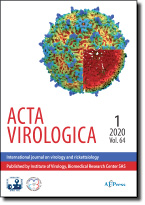Journal info
|
||
Select Journal
Journals
Bratislava Medical Journal Endocrine Regulations General Physiology and Biophysics Neoplasma Acta Virologica Current articles 2023 2022 2021 2020 2019 2018 2017 2016 2015 2014 2013 2012 2011 2010 2009 2008 2007 2006 2005 2004 2003 Studia Psychologica Cardiology Letters Psychológia a patopsych. dieťaťa Kovove Materialy-Metallic Materials Slovenská hudbaWebshop Cart
Your Cart is currently empty.
Info: Your browser does not accept cookies. To put products into your cart and purchase them you need to enable cookies.
Acta Virologica Vol.57, No.2 p.247-256, 2013 |
||
| Title: HA2 glycopolypeptide of influenza A virus and antiviral immunity | ||
| Author: E. Varečková, V. Mucha, F. Kostolanský | ||
| Abstract: Influenza A viruses (IAVs) cause acute respiratory infections in humans against which an effective prevention has not yet been developed due to their high variability and broad host specificity. The permanent threat of arising new influenza pandemic is represented by avian viruses which after their interspecies transmission can cause a disease with a devastating impact on humans lacking the specific immunity. Since the current vaccines inducing virus-neutralizing (VN) antibodies are targeted at a variable globular part of hemagglutinin (HA), their efficacy is limited and they need permanent updating. On the other hand, conserved IAV antigens such as proton channel M2, membrane protein M1 or nucleoprotein (NP) do not induce VN antibodies, but they do induce heterosubtypic protection resulting in the reduction of virus replication and an improved recovery from the disease. From this point of view recent attention has also been focused on the conserved part of HA, its HA2 glycoprotein (HA2). The main aspects revealing a contribution of HA2 gp to protective immunity are discussed in this review. |
||
| Keywords: influenza A infection; HA2 glycopolypeptide; immune protection; monoclonal antibodies | ||
| Year: 2013, Volume: 57, Issue: 2 | Page From: 247, Page To: 256 | |
| doi:10.4149/av_2013_02_247 |
||
|
|
 download file download file |
|

